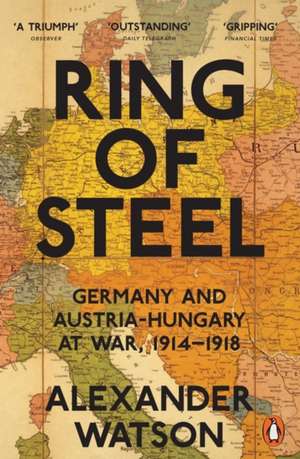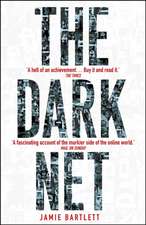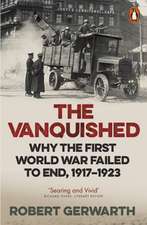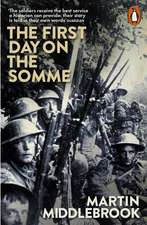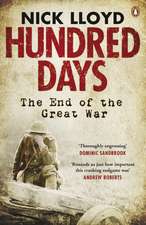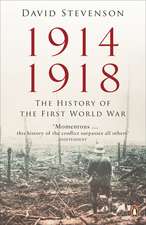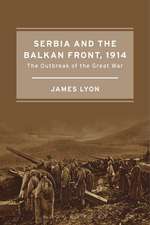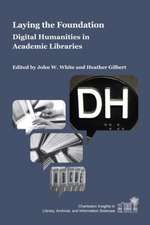Ring of Steel: Germany and Austria-Hungary at War, 1914-1918
Autor Alexander Watsonen Limba Engleză Paperback – 3 iun 2015
Winner of the 2014 Wolfson History Prize, the 2014 Guggenheim-Lehrman Prize in Military History, the Society for Military History's 2015 Distinguished Book Award and the 2015 British Army Military Book of the Year
For the empires of Germany and Austria-Hungary the Great War - which had begun with such high hopes for a fast, dramatic outcome - rapidly degenerated as invasions of both France and Serbia ended in catastrophe. For four years the fighting now turned into a siege on a quite monstrous scale. Europe became the focus of fighting of a kind previously unimagined. Despite local successes - and an apparent triumph in Russia - Germany and Austria-Hungary were never able to break out of the the Allies' ring of steel.
In Alexander Watson's compelling new history of the Great War, all the major events of the war are seen from the perspective of Berlin and Vienna. It is fundamentally a history of ordinary people. In 1914 both empires were flooded by genuine mass enthusiasm and their troubled elites were at one with most of the population. But the course of the war put this under impossible strain, with a fatal rupture between an ever more extreme and unrealistic leadership and an exhausted and embittered people. In the end they failed and were overwhelmed by defeat and revolution.
| Toate formatele și edițiile | Preț | Express |
|---|---|---|
| Paperback (2) | 104.39 lei 21-33 zile | +41.87 lei 6-12 zile |
| Penguin Books – 3 iun 2015 | 104.39 lei 21-33 zile | +41.87 lei 6-12 zile |
| BASIC BOOKS – 27 mar 2017 | 292.81 lei 6-8 săpt. |
Preț: 104.39 lei
Preț vechi: 122.49 lei
-15% Nou
Puncte Express: 157
Preț estimativ în valută:
19.97€ • 20.86$ • 16.53£
19.97€ • 20.86$ • 16.53£
Carte disponibilă
Livrare economică 14-26 martie
Livrare express 27 februarie-05 martie pentru 51.86 lei
Preluare comenzi: 021 569.72.76
Specificații
ISBN-13: 9780141042039
ISBN-10: 0141042036
Pagini: 816
Dimensiuni: 129 x 198 x 35 mm
Greutate: 0.58 kg
Editura: Penguin Books
Colecția Penguin
Locul publicării:London, United Kingdom
ISBN-10: 0141042036
Pagini: 816
Dimensiuni: 129 x 198 x 35 mm
Greutate: 0.58 kg
Editura: Penguin Books
Colecția Penguin
Locul publicării:London, United Kingdom
Notă biografică
Alexander
Watson
is
the
author
of
the
prize-winning
history
of
the
Central
Powers
in
the
First
World
War,Ring
of
Steel(also
published
by
Penguin).
He
is
Professor
of
History
at
Goldsmiths,
University
of
London.
Recenzii
In
a
year
dominated
by
memories
of
the
First
World
War,
this
supremely
accomplished
book
stands
out.
Not
only
does
it
look
at
the
conflict
from
the
perspective
of
the
losing
Central
Powers,
imperial
Germany
and
Austria-Hungary,
but
it
brings
together
political,
military,
economic
and
cultural
history
in
an
enormously
impressive
narrative.
Although
Watson's
book
is
based
on
archival
research
in
Germany,
Austria
and
Poland,
his
scholarship
is
never
suffocating.
His
accounts
of
the
terrible
struggle
on
the
vast
Eastern
Front
are
brisk
and
well-judged,
while
he
is
particularly
good
at
bringing
alive
the
mood
on
the
German
and
Austrian
home
fronts,
from
soldiers'
letters
to
children's
nursery
rhymes.
Above
all,
his
book
could
not
be
a
more
powerful
reminder
that,
as
bad
as
the
war
was
for
Britain,
it
was
far,
far
worse
for
the
losers
Will be revelatory to most British readers
British historians have tended to view the Great War predominantly from the side of the Allies. Watson has done our understanding an inestimable service by examining these familiar events from the perspective of the Central Powers ... Watson's shift of perspective offers illuminating sidelights ... Watson's balance is at its most strikingly effective in a superlative chapter on Germany's catastrophic decision to launch its U-boat campaign. But it is the lost hordes of East European refugees who create the most haunting images in the immense canvas of this outstanding book
A truly indispensable contribution . . . It is a mark of talent in a historian to take familiar narratives and open them to new interpretation. Mr. Watson's book is a brilliant demonstration of this skill . . .Ring of Steelis a history as much of the emotions that hardship and war produced as of politics or diplomacy . . . Watson manages to mesh his dense bottom-up description with the grand narrative of the war's key moments of decision
An immensely authoritative new history of Germany and Austria-Hungary between 1914 and 1918. Watson writes fluently and compellingly, and his remarkable command of the sources offers new insight and information on almost every page. Soundly judged on the many controversial aspects of his topic, Watson is particularly ground-breaking in evoking the popular experience of the conflict and when investigating the atrocities that all too frequently were its accompaniment
InRing of SteelAlexander Watson shows us what it was like to be pierced by the sharp end of the Allied juggernaut. He takes us on an illuminating tour of the German and Austrian trenches, their querulous headquarters, their cold, starving towns, and their increasingly desperate government ministries. This is a fascinating account of the Great War from 'the other side of the hill,' but also an explanation for the chaos that followed: communism, fascism, depression, and Europe's plunge into a Second World War
The Central Powers' Great War was not waged from the top down. Instead, as Alexander Watson's comprehensively researched and clearly presented analysis demonstrates, in both Germany and Austria-Hungary popular support was vital to mobilizing and sustaining an increasingly-futile conflict
This book offers Anglo-Saxon students of the First World War a usefully original perspective
Alexander Watson's remarkable history of the first world war makes clear as never before how this unparalleled conflict impacted on and changed the societies of central Europe, particularly Germany and Austria-Hungary
Will be revelatory to most British readers
British historians have tended to view the Great War predominantly from the side of the Allies. Watson has done our understanding an inestimable service by examining these familiar events from the perspective of the Central Powers ... Watson's shift of perspective offers illuminating sidelights ... Watson's balance is at its most strikingly effective in a superlative chapter on Germany's catastrophic decision to launch its U-boat campaign. But it is the lost hordes of East European refugees who create the most haunting images in the immense canvas of this outstanding book
A truly indispensable contribution . . . It is a mark of talent in a historian to take familiar narratives and open them to new interpretation. Mr. Watson's book is a brilliant demonstration of this skill . . .Ring of Steelis a history as much of the emotions that hardship and war produced as of politics or diplomacy . . . Watson manages to mesh his dense bottom-up description with the grand narrative of the war's key moments of decision
An immensely authoritative new history of Germany and Austria-Hungary between 1914 and 1918. Watson writes fluently and compellingly, and his remarkable command of the sources offers new insight and information on almost every page. Soundly judged on the many controversial aspects of his topic, Watson is particularly ground-breaking in evoking the popular experience of the conflict and when investigating the atrocities that all too frequently were its accompaniment
InRing of SteelAlexander Watson shows us what it was like to be pierced by the sharp end of the Allied juggernaut. He takes us on an illuminating tour of the German and Austrian trenches, their querulous headquarters, their cold, starving towns, and their increasingly desperate government ministries. This is a fascinating account of the Great War from 'the other side of the hill,' but also an explanation for the chaos that followed: communism, fascism, depression, and Europe's plunge into a Second World War
The Central Powers' Great War was not waged from the top down. Instead, as Alexander Watson's comprehensively researched and clearly presented analysis demonstrates, in both Germany and Austria-Hungary popular support was vital to mobilizing and sustaining an increasingly-futile conflict
This book offers Anglo-Saxon students of the First World War a usefully original perspective
Alexander Watson's remarkable history of the first world war makes clear as never before how this unparalleled conflict impacted on and changed the societies of central Europe, particularly Germany and Austria-Hungary
